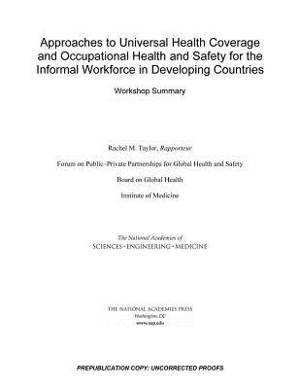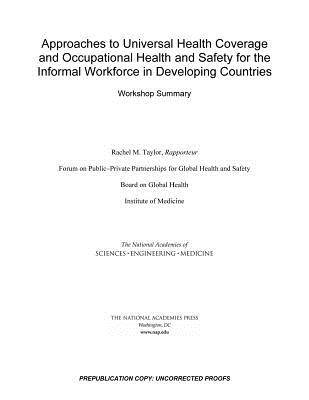
- Retrait gratuit dans votre magasin Club
- 7.000.000 titres dans notre catalogue
- Payer en toute sécurité
- Toujours un magasin près de chez vous
- Retrait gratuit dans votre magasin Club
- 7.000.0000 titres dans notre catalogue
- Payer en toute sécurité
- Toujours un magasin près de chez vous
Approaches to Universal Health Coverage and Occupational Health and Safety for the Informal Workforce in Developing Countries
Workshop Summary
National Academies of Sciences Engineering and Medicine, Institute of Medicine, Board on Global Health, Forum on Public-Private Partnerships for Global Health and SafetDescription
Universal health coverage (UHC) has been recognized by the World Health Organization as a key element in reducing social inequality and a critical component of sustainable development and poverty reduction. In most of the world UHC is sought through a combination of public and private-sector health care systems. In most low- and middle-income countries health systems are evolving to increasingly rely on the private sector because the public sector lacks the infrastructure and staff to meet all health care needs. With growing individual assets available for private-sector expenditure, patients often seek better access to technology, staff, and medicines. However, in low-income countries nearly 50 percent of health care financing is out-of-pocket. With the expected increase in the overall fraction of care provided through the private sector, these expenditures can be financially catastrophic for individuals in the informal workforce.
In the global workforce of approximately 3 billion people, only 10 to 15 percent are estimated to have some type of access to occupational health services. The informal workforce is growing worldwide, and the degree to which its occupational health needs are satisfied depends on the capabilities of the general health care system. In July 2014, the Institute of Medicine held a workshop on approaches to universal health coverage and occupational health and safety for informal sector workers in developing countries. This report summarizes the presentations and discussions from this workshop. Approaches to Universal Health Coverage and Occupational Health and Safety for the Informal Workforce in Developing Countries identifies best practices and lessons learned for the informal workforce in developing countries in the financing of health care with respect to health care delivery models that are especially suitable to meeting a population's needs for a variety of occupational health issues, including the prevention of or mitigation of hazardous risks and the costs of providing medical and rehabilitation services and other benefits to various types of workers within this population. These experiences and lessons learned may be useful for stakeholders in moving the discussions, policies, and mechanisms forward to increase equitable access to quality health services without financial hardship for the informal workforce.
Spécifications
Parties prenantes
- Auteur(s) :
- Editeur:
Contenu
- Nombre de pages :
- 140
- Langue:
- Anglais
Caractéristiques
- EAN:
- 9780309374064
- Date de parution :
- 06-07-16
- Format:
- Livre broché
- Format numérique:
- Trade paperback (VS)
- Dimensions :
- 150 mm x 229 mm
- Poids :
- 226 g

Les avis
Nous publions uniquement les avis qui respectent les conditions requises. Consultez nos conditions pour les avis.






